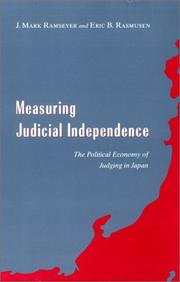| Listing 1 - 4 of 4 |
Sort by
|
Book
ISBN: 9781783479184 Year: 2015 Publisher: Cheltenham Elgar
Abstract | Keywords | Export | Availability | Bookmark
 Loading...
Loading...Choose an application
- Reference Manager
- EndNote
- RefWorks (Direct export to RefWorks)
Book
ISBN: 9780415540216 9781317487333 9781138554092 9781317487340 113855409X 1315709902 1317487338 9781315709901 9781317487326 Year: 2015 Volume: 13 Publisher: London Routledge
Abstract | Keywords | Export | Availability | Bookmark
 Loading...
Loading...Choose an application
- Reference Manager
- EndNote
- RefWorks (Direct export to RefWorks)
Trial by jury is not a fundamental part of the Japanese legal system, but there has been a recent important move towards this with the introduction in 2009 of the lay assessor system whereby lay people sit with judges in criminal trials. This book considers the debates in Japan which surround this development. It examines the political and socio-legal contexts, contrasting the view that the participation of ordinary citizens in criminal trials is an important manifestation of democracy, with the view that Japan as a society where authority is highly venerated is not natural territory for a system where lay people are likely to express views at odds with expert judges. It discusses Japan's earlier experiments with jury trials in the late 19th Century, the period 1923-43, and up to 1970 in US-controlled Okinawa, compares developing views in Japan on this issue with views in other countries, where dissatisfaction with the jury system is often evident, and concludes by assessing how the new system in Japan is working out and how it is likely to develop.
J4712 --- Japan: Law and jurisprudence -- judicial organization and procedures -- court and trials --- Jury --- Social science --- Ethnic Studies --- General. --- E-books
Book
ISBN: 9781849804103 1784717495 1849804109 Year: 2015 Publisher: Cheltenham Elgar
Abstract | Keywords | Export | Availability | Bookmark
 Loading...
Loading...Choose an application
- Reference Manager
- EndNote
- RefWorks (Direct export to RefWorks)
J4712 --- J4700.90 --- Japan: Law and jurisprudence -- judicial organization and procedures -- court and trials --- Japan: Law and jurisprudence -- history -- postwar Shōwa (1945- ), Heisei period (1989- ), contemporary --- Justice, Administration of --- Law --- Law reform --- Power (Social sciences) --- Citizen participation --- Political aspects --- Justice, Administration of - Japan - Citizen participation --- Law - Political aspects - Japan --- Law reform - Japan

ISBN: 1282537695 9786612537691 0226703878 9780226703879 9780226703886 0226703886 9781282537699 6612537698 Year: 2003 Publisher: Chicago University of Chicago Press
Abstract | Keywords | Export | Availability | Bookmark
 Loading...
Loading...Choose an application
- Reference Manager
- EndNote
- RefWorks (Direct export to RefWorks)
The role of the U.S. Supreme Court in the aftermath of the 2000 presidential election raised questions in the minds of many Americans about the relationships between judges and political influence; the following years saw equally heated debates over the appropriate role of political ideology in selecting federal judges. Legal scholars have always debated these questions-asking, in effect, how much judicial systems operate on merit and principle and how much they are shaped by politics. The Japanese Constitution, like many others, requires that all judges be "independent in the exercise of their conscience and bound only by this Constitution and its laws." Consistent with this requirement, Japanese courts have long enjoyed a reputation for vigilant independence-an idea challenged only occasionally, and most often anecdotally. But in this book, J. Mark Ramseyer and Eric B. Rasmusen use the latest statistical techniques to examine whether that reputation always holds up to scrutiny-whether, and to what extent, the careers of lower court judges can be manipulated to political advantage. On the basis of careful econometric analysis of career data for hundreds of judges, Ramseyer and Rasmusen find that Japanese politics do influence judicial careers, discreetly and indirectly: judges who decide politically charged cases in ways favored by the ruling party enjoy better careers after their decisions than might otherwise be expected, while dissenting judges are more likely to find their careers hampered by assignments to less desirable positions. Ramseyer and Rasmusen's sophisticated yet accessible analysis has much to offer anyone interested in either judicial independence or the application of econometric techniques in the social sciences.
Judges --- Judicial process --- Political questions and judicial power --- Courts --- Judicial activism --- Judicial power and political questions --- Act of state --- Administrative discretion --- Judicial review --- Jurisdiction --- Law --- Rule of law --- Separation of powers --- Decision making, Judicial --- Judicial behavior --- Judicial decision making --- Procedure (Law) --- Political aspects --- Psychological aspects --- Interpretation and construction --- J4700.90 --- J4701 --- J4709 --- J4710 --- J4712 --- Japan: Law and jurisprudence -- history -- postwar Shōwa (1945- ), Heisei period (1989- ), contemporary --- Japan: Law and jurisprudence -- policy, legislation, guidelines, codes of behavior --- Japan: Law and jurisprudence -- theory, methodology and philosophy --- Japan: Law and jurisprudence -- judicial organization and procedures --- Japan: Law and jurisprudence -- judicial organization and procedures -- court and trials --- supreme court, legal system, judiciary, political influence, politics, selection, federal judges, merit, principle, japan, japanese constitution, communism, ideology, criminal, government, justice, taxpayers, constitutional law, injunctions, malapportionment, military, elections, protest, activism, free speech, nonfiction, judicial process, power, courts, decision making.
| Listing 1 - 4 of 4 |
Sort by
|

 Search
Search Feedback
Feedback About UniCat
About UniCat  Help
Help News
News